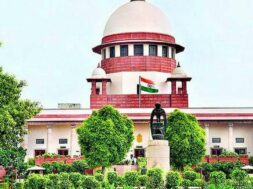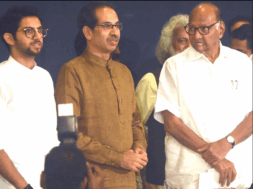
Manas Dasgupta
NEW DELHI, Nov 21: The Supreme Court on Tuesday came down heavily on the Aam Aadmi Party ruled Punjab and Delhi governments and the BJP ruled Uttar Pradesh government for failure to control air pollution in the National Capital Region despite knowing the problem for years.
“This is the most polluted November in six years… the problem is known (and) it is your job to control it,” a bench of Justices SK Kaul and S Dhulia told the three states as it continues a marathon hearing into a clutch of petitions about the toxic air that blankets and chokes the national capital every winter.
The apex court was particularly harsh on the Punjab government even asking it to take a leaf out of the neighbouring Haryana government’s decision to provide incentives to the farmers for desisting from burning agricultural waste (stubble). Supporting the poor farmers who the court felt was made a villain, the bench also suggested the Punjab government to offer a measure of support to farmers by taking the responsibility of disposal of stubble and take punitive action against the burning of agricultural waste, which adds significantly to Delhi’s AQI crisis.
On another count, the court also reprimanded the Delhi government over delayed funding of the Delhi-Meerut RRTS (regional rapid transport system) and ordered funds be transferred from the AAP’s spending on ads. “You have not complied with our order. We don’t have any other way. You can’t take us for granted…”
In July, the court rebuked the Delhi government after it said it could not contribute to a rail network that will connect the city to neighbouring states and is expected to reduce vehicular traffic. The Delhi government had expressed its inability to provide its share of funds – amounting to ₹ 415 crore – after which the court directed it to place on record funds spent on ads in the last three years. This order was stayed for a week. “If Delhi government doesn’t pay the RRTS amount within a week, the funds will be transferred from its ‘advertisements’ allocations,” the court warned the ruling AAP.
The court was more sympathetic to the condition of farmers in Punjab, who have come under severe scrutiny (again) for burning agricultural crop waste, stubble. “The farmer is being made a villain… and he is not being heard from. He must have some reason to burn this stubble.” This was not the first time the Supreme Court has pointed out that farmers – who have been accused by all sides of contributing to the air quality crisis – have not been represented in the hearing.
The court also suggested the Punjab government offer farmers incentives to not burn stubble. “They should learn from Haryana regarding incentives given to farmers,” the court observed. “One problem is that the people who are burning the stubble will not come here (they are not represented here). We understand that those who have substantial land holdings will not come here (to the court, because they can afford the machinery to safely dispose farm waste)…”
“But people with small land holdings are struggling with stubble burning. For poor farmers, the state should fund 100 per cent of machinery… this is the duty of the state,” the court told Punjab. “And then the government can take the product and sell it…”
Every winter, the air quality in Delhi and surrounding regions plunges to extremely toxic levels, triggering widespread health scares and forcing schools and colleges to shut down for days. This morning the AQI was at 323, indicating ‘very poor’ air quality, central government data said.
There are various factors that contribute to the hazardous air covering Delhi at this time of the year, including farm fires, fireworks during Diwali, vehicular traffic and dust from construction activities, all of which hangs over the city because there is no wind to disperse the pollutants. On Monday, Punjab reported 634 farm fires in a day as many farmers continue to set paddy crop waste on fire – so they can ready the field for a quick second crop – despite police warnings.
The Supreme Court said the Punjab government’s report suggests that 8,481 meetings have been held with farmers and farm leaders to convince them not to burn paddy straws by state house officers. It also recorded in its order that the upward trend in farm fires has not abated. “984 FIRs have been lodged against landowners for stubble burning. Environmental compensation amounting to more than ₹2 crore has been imposed of which ₹18 lakh has been recovered,” the apex court said.
“Why doesn’t the Punjab government make the process of crop residue 100% free? To burn it, all the farmer needs to do is light a matchstick. Machine for the management of crop residue to farmers is not everything. Even if the machine is given for free, there is diesel cost, manpower, etc,” the Supreme Court said, asking why Punjab cannot fund diesel, manpower, etc. and utilise the by-product.
“The state of Punjab should also take a cue from the state of Haryana in the manner in which financial incentives are given,” said the Supreme Court. The court also observed that land in Punjab is becoming arid slowly because the water table is getting depleted. If the land runs dry, everything else will get affected, the apex court said. “Somewhere the farmers should understand or be made to understand the consequences of growing paddy,” it told the Punjab government.
The court also asked attorney general R Venkatramani to explore “how you can discourage paddy and encourage alternate crops”.
The Supreme Court, in its order, also said that a committee must look into the aspect of discouraging the cultivation of rice. Long-term impact could be disastrous, it said, adding that, “Thus, persons concerned must put their heads together to see how to encourage switching over the alternate crop.” The top court observed that state governments and the Union government must forget the politics and figure out how to do this. “If the blame game continues, land will run dry, water will disappear,” the bench cautioned.













